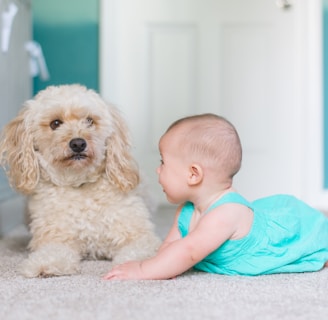Why Pets Feel Like Children: The Emotional Bond Behind Their Dependence
Pets depend on us for everything, and that deep responsibility shapes how we bond with them. Learn how this emotional dynamic affects both pets and their owners—and why losing them can feel like losing family.
PET PARENTINGSCIENCEPET GRIEF
5/22/20243 min read


The emotional impact of being everything to your pet
The bond between humans and their pets is a complex and deep phenomenon, characterized by a series of interactions that foster an intense emotional relationship. Often, this bond is compared to the one shared with a child due to the total dependence pets have on their owners. Pets rely entirely on humans for their survival, which generates a level of care and responsibility that can be very similar to the experience of raising a child.
Pets are completely dependent on their owners to meet all their basic needs, which include food, shelter, medical care, and affection. Unlike human children, who eventually grow and reach a degree of independence, pets rely on their owners throughout their entire lives. This total dependence not only shapes the behavior of pets but also has profound implications for the psychology of both the pets and the humans who care for them.
From the pet's perspective, this dependence can manifest in a range of behaviors and attitudes. For example, dogs may develop separation anxiety when their owners are not present, as their emotional well-being is closely tied to the presence and attention of their caregivers. Cats, although often considered more independent, also show signs of emotional dependence, such as seeking their owner's proximity and consistently displaying affection.
For pet owners, this dependent relationship can foster a deep sense of responsibility and purpose. Meeting the needs of a pet can be demanding, but it also provides a constant source of emotional satisfaction. The relationship between an owner and their pet can be especially meaningful for people who live alone or seek a consistent emotional connection. The need to care for another being can help reduce feelings of loneliness and provide structure and routine to daily life.
Moreover, this constant responsibility can improve the mental health of pet owners. Studies have shown that interaction with pets can lower stress and anxiety levels, encourage the production of oxytocin and other well-being-related chemicals, and generally improve quality of life. However, the pressure of being the sole provider for all of a pet's needs can also be stressful for some, especially in cases of illness or financial struggle.
The nature of the bond between humans and pets
The strength of this bond is built in the smallest moments: feeding, walking, cuddling, playing. These everyday acts do more than meet a pet’s basic needs, they create a shared emotional world. Over time, these interactions reinforce the sense that pets are not just animals we care for, but family members we love deeply.
In many homes, pets are perceived and treated much like children. But this perception varies greatly between cultures. In some societies, pets are primarily viewed as companions, while in others, they hold a near-equal place to human family members. Cultural context influences how we care for our animals and how we grieve them when they’re gone.
Coping with the loss of a pet
When a beloved pet passes, the grief can be overwhelming. Our pets are more than just animals; they are companions, family members, and a constant source of unconditional love. Their complete dependence on us deepens the emotional bond, which is why their absence can leave a huge void. Many people experience intense sadness, emptiness, and even guilt as they try to adjust to a daily life that no longer includes their trusted friend.
This kind of grief is real and valid, and you don’t have to go through it alone.
Our Personalized Pet Grieving Program is here to support you through this difficult time. Designed for people who need gentle, thoughtful guidance, the program offers 8 weeks of tailored activities based on your emotional needs, your type of loss, and the kind of relationship you had with your pet.
Each week, you’ll receive supportive tools and reflections to help you:
Process your grief in a safe and personal way
Find meaning in your experience
Honor the memory of your pet
And gently reconnect with your emotional strength
The activities are based on the most effective grief support methods—delivered in a compassionate format. You’ll also receive resources you can return to in future moments of loss or difficulty, because we know that grief isn’t linear, and healing takes time.
As part of our mission, 10% of all profits are donated to animal shelters, so your healing journey also supports other pets in need.
If you're struggling with the loss of a pet, we invite you to explore the program and take the first step toward healing. Your love was real. Your grief is valid. And support is here when you're ready.
© 2025 Pet Grieving. All rights reserved.


The Pet Grieving Project offers personalized guidance and resources to cope with pet loss for those who need support but do not require professional therapy.
We are open every day of the year to support you whenever you need it.
Created with ❤ to help pet parents heal after their loss.
